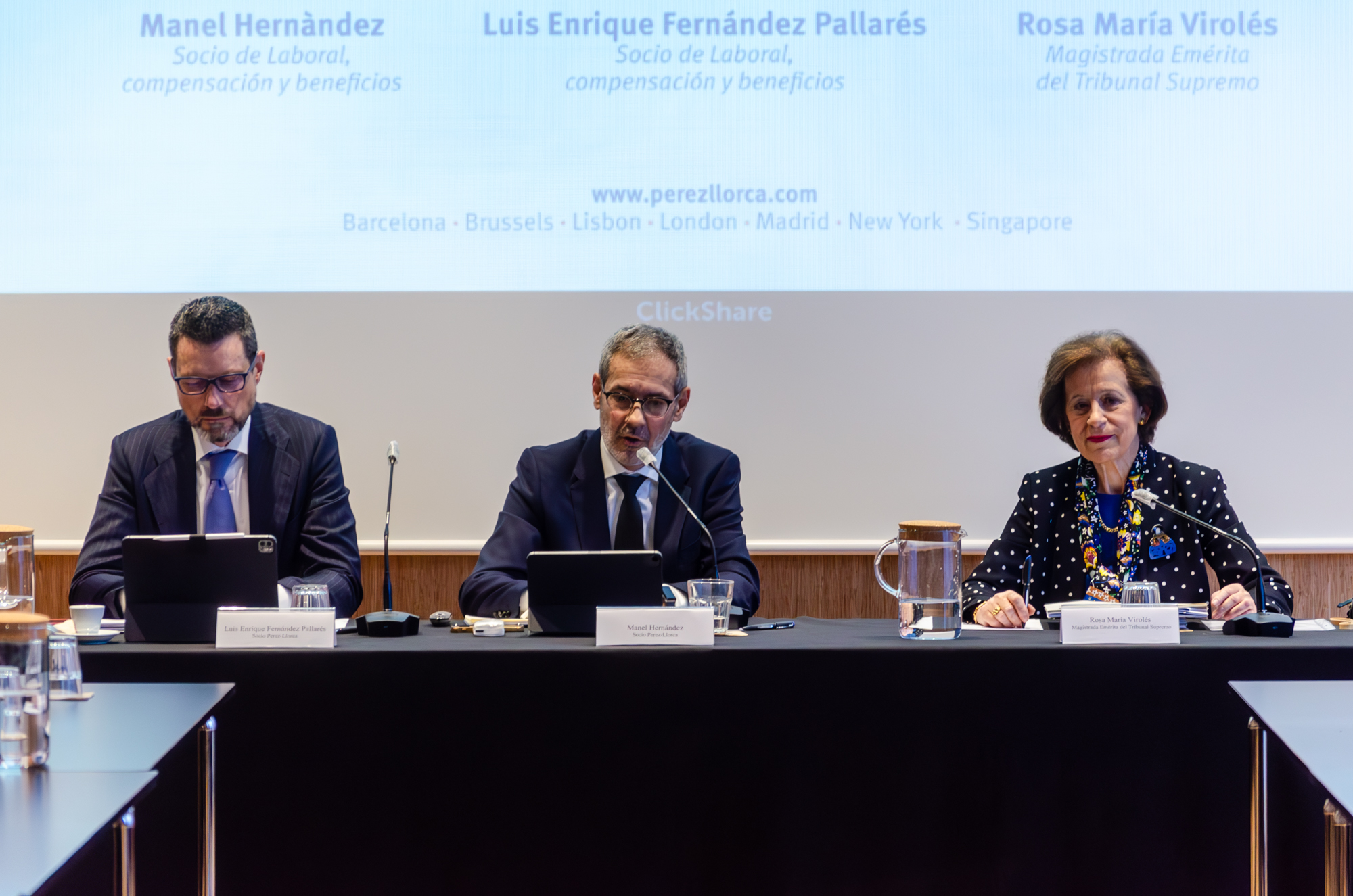Pérez-Llorca’s Employment, Compensation and Benefits practice area organised the session entitled “Employment law developments and trends 2024, with a focus on severance payments and reconciliation measures”. The seminar was attended by Manel Hernàndez and Luis Enrique Fernández Pallarés, partners the firm’s practice, and Rosa María Virolés, Emeritus Judge of the Supreme Court.
Manel Hernàndez opened the session, and began his speech by explaining the new developments in relation to costs in labour proceedings. For Hernàndez, this measure, among others, is intended to indirectly reduce the number of cases to be resolved before the labour courts. For this reason, a series of provisions in the Law Regulating Labour Courts (“LRLC”) have been amended, such as article 97.3, which will enter into force on 20 March 2024, and the rule contained in article 86 bis of the LRLC, which introduces the witness procedure.
Another one of the new developments highlighted at the session was the inclusion of trainees in the Social Security system through a single article, section 34 of Royal Decree-law 2/2023, of 16 March, on urgent measures to extend pensioners’ rights, reduce the gender gap and establish a new framework for the sustainability of the public pension system. With regard to obliged entities, a distinction is made between paid and unpaid traineeships. “As for the economic consequences, they are exempt from contribution at 95% in both cases, i.e. it is an extremely low contribution for common contingencies”, Hernàndez explained.
Finally, the Pérez-Llorca partner concluded his presentation with two issues to be taken into account in this year’s employment law agenda: the update to retirement pensions and the new Minimum Interprofessional Wage approved in Royal Decree 145/2024 of 6 February 2024.
Next, Luis Enrique Fernández Pallarés analysed the issues related to the Government Agreement signed between the PSOE and SUMAR on 24 October 2023. Fernández Pallarés remarked that the main problem of a reduction in terms of hours per week without a reduction in pay is the decrease in productivity, as this measure implicitly implies an increase in pay. On this point, the expert pointed out that “this creates a doubly detrimental effect for companies, in terms of the increase in the minimum wage and the reduction in working hours”.
Likewise, Fernández Pallarés highlighted the Preliminary Draft Law on predictable and transparent working conditions approved by the Council of Ministers on 6 February 2024, the regulatory result of the transposition of Directive (EU) 2019/1152 of the European Parliament and of the Council of 20 June 2019 on transparent and predictable working conditions in the European Union. The aim of this regulation is to provide some certainty and transparency of the working conditions that workers have and to adapt them to new forms of work, such as work on digital platforms and remote work.
In the third section of the event, Rosa María Virolés presented the main rules on severance pay, with an emphasis on Article 4 of ILO Convention 158 of 1982 and Article 24 of the European Social Charter. In this regard, the Emeritus Judge of the Supreme Court advocated the application of the Convention in cases where the assessed severance pay may not be sufficient to cover damages, and gave as an example the judgement of 31 January 2023 of the High Court of Catalonia and the judgement of the High Court of the Balearic Islands 237/2023.
In terms of work-life balance, Virolés emphasised Law 15/2022 and Royal Decree 5/2023 on measures to reconcile work and family life, which extends the grounds for wrongful dismissal. In relation to measures to adapt working hours, Virolés stated that “these are individual rights of the worker which are not linked to other circumstances, and place the burden of justifying the denial of the measure to improve the worker’s work-life balance on the company”. In the event that no agreement is reached, the case would be referred to the labour courts under article 139 of the LRLC.
